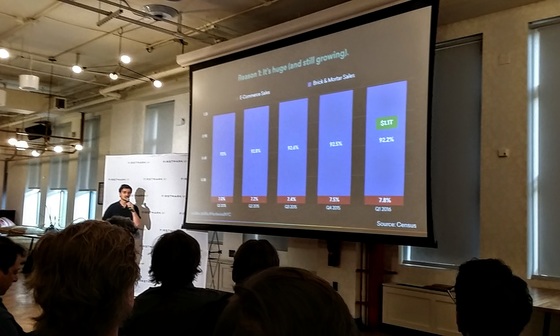3D, VR Content As Social Platforms
NEW YORK—So “who” is not a social platform these days? Even Sketchfab sounds like one the way it has amassed 100,000 members who publish 3D and VR content for everyone to share. And it has all the top guns for clients – Adobe, Facebook, Microsoft Hololens, among others.
Sketchfab’s Alban Denoyel, co-founder and CEO, was at the Hardwired meetup last September 14 along with Vibhu Norby, CEO of b8ta, a retail store designed for trying and buying new connected devices; Ben Einstein, general partner of Bolt, an early-stage VC firm focused on hardware and IoT; and Anthony Batt, founder & EVP of WEVR, which handles VR content production and network.
“3D is eating the world,” Denoyel said, as he showed samples of how 3D has been used to preserve cultural heritage, document world events, and market products and change how we see places, people and food.
Using Sketchfab is easy. You can upload files in almost any 3D format, directly on sketchfab.com or using one of its exporters. Once models are on the site, you can embed them on any web page and share on other platforms like WordPress, Facebook, Kickstarter and Linkedin.
Vibhu Norby, CEO and founder of b8ta, came from Palo Alto present at the meetup as well. B8ta is a retail store like no other. It sells IoTs, connected devices and other hardware products.
For Norby, a retail store is a place to “discover, engage and demo” a product, which websites can’t do.
Today, retail is demand-gen, not demand fulfillment, he added.
Launched December last year, b8ta think stores can be used to funnel awareness.
Norby said pricing is the most important decision and you should build a strategy around it. He also thinks you should budget 15 percent of your margin for reverse logistics and customer support.
Before the last presentation, host Matt Turck sat down to talk with Bolt general partner Ben Einstein whose company invests in hardware and IoT devices.
He discussed the technical and product risks for hardware startups, pointing out the difference also between low-risk products like Fitbit and high-risk products like the Roomba.
Fitbit is a low risk proposition, because it simply calculates your steps where high-risk products can be far more complex and harder to market.
Bolt’s clients in the past include top tech companies such as Apple, Disney, Google and IDEO.
Last presenter was Batt of WEVR, a company that produces virtual reality content and has a VR platform called Transport.
Transport hopes to entice brave artists and storytellers to work in virtual reality and deliver a constant flow of high quality simulations to millions of new headsets.
Hardwired NYC, organized by FirstMark Capital, is a fast-growing community that explores frontier technology and emerging computing platforms: internet of things, virtual reality, augmented reality, drones, 3D printing, robotics, etc.
